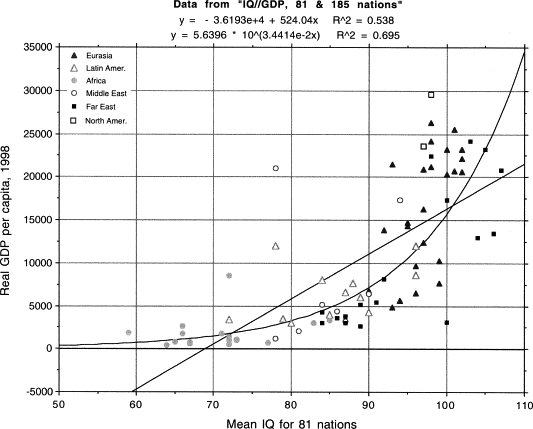IQ and the Wealth of Nations: 10 + Years and Going Strong
Lynn and Vanhanen's famous book, IQ and the Wealth of Nations, was published in February of 2002. Because it made a credible link between the average intelligence of its people and a nation's achievements and economic prosperity, the book came under immediate and unrelenting attack from the politically correct pseudo-intellectual quarter.
The most recent broadside attack against Lynn and Vanhanen comes from Charles Kenny in Foreign Policy, Dumb and Dumber. Unfortunately, such rebuttals to Lynn and Vanhanen are not held to high standards by the mainstream press or by academia. Perhaps that is why Steve Sailer was able to make such quick and devastating work of Kenny's argument.
Lynn and Vanhanen's national IQ data has been criticised, which is certainly fair to do. Social scientists have been particularly outraged at the low average IQ assigned to SubSaharan Africa by L & V (approx. 70). But out of all the critics, virtually no one is willing to jump in and produce better data! Surely if one were so eager to prove this vexing thesis wrong, one would secure the proper grant, and go out and compile the definitive data that would disprove the disturbing idea. The closest that a researcher has come to doing this is the work of Jelte Wicherts (PDF). But it requires little reading of Wilcherts' argument to discover that his selection criteria are even more questionable than Lynn and Vanhanen's -- and the best Wilcherts could do was to raise the mean SS African IQ to 82, with all of his fudge-factors of selection.
Is the actual average IQ of subSaharan Africa closer to 75 than to either 70 or 82? Probably. Could better nutrition and a higher stimulus environment raise that average IQ closer to the African American average IQ of 85? Probably. But researchers must deal with data, the best that they can. When they deal in wishful thinking they lose all credibility.
To the extent possible, within the treacherous modern world of PC hyper-sensitivity, Lynn and Vanhanen's data has been updated and generally confirmed. More here.
Over the intervening years, national IQ data has been plotted against GDP according to linear models and according to exponential models. More here. The exponential model would seem to provide a better fit of the data.
Even without arguing about the causes or IQ differences, or possible cures for the problem, the startling trend, in terms of the importance of IQ (or smart fraction) and national prosperity, should be clear to even the most reluctant observer.
The question of why some nations are rich and some nations are poor, cannot be answered by a single parameter. But after ten years of considering the relationship of national IQ (including smart fraction) and national prosperity, the relationship has held up very well indeed.
Labels: IQ, wealth of nations


5 Comments:
I can also point to this recent study, which strongly support Lynn and Vanhanen's conclusion. A higher IQ promotes better institutions, and institutional qualities improve economic performance.
Quality of Institutions : Does Intelligence Matter? (Kalonda-Kanyama & Kodila-Tedika)
Thanks, MH.
It is an interesting argument.
I guess I will be the lone voice that suggests the mere notion of using measurements of intelligence designed by the people in power would likely reflect positively on them and not so favorably on the people opposite them. But what do I know.
At least you can repeat the dominant politically correct mantra.
You may know just enough to belong in government, academia, or journalism.
fyi. Haplogroups as evolutionary markers of cognitive ability -
Rindermann paper on http://tinyurl.com/82hbcaq
Post a Comment
“During times of universal deceit, telling the truth becomes a revolutionary act” _George Orwell
<< Home